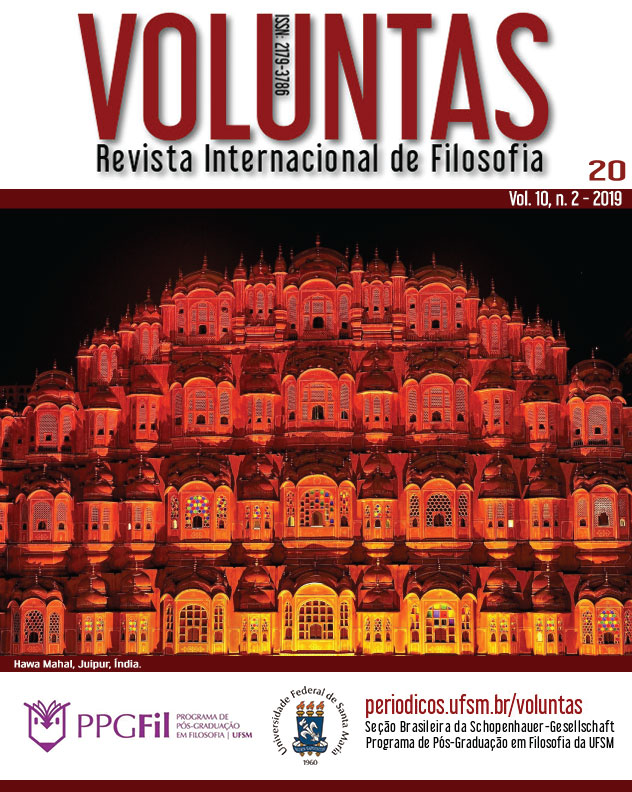Pessimism as posture: the affective element of the thesis of the worst of possible worlds
DOI:
https://doi.org/10.5902/2179378638203Keywords:
Pessimism, Suffering, Schopenhauer, FeelingAbstract
The main aim of this work is to address the pessimistic thesis found in Arthur Schopenhauer’s philosophy starting from the notion of posture. I expose here the distinctive traits of his Metaphysics of the Will and the implication for the evaluation of the world as the “worst of all possible worlds.” Next I address the connection between philosophy and temperament, from a few biases identified in affective changes, as well as to evaluate how this connection occurs in the pessimistic philosophy of Schopenhauer. After this analysis it will be possible to evaluate the schopenhauerian pessimism from the metaphilosophical thesis which states that temperament is part of philosophical postures, which must be taken into account in the analysis of the scope of general philosophical theses.Downloads
References
BEISER, F. Weltschmerz: Pessimism in German Philosophy, 1860–1900. Oxford University Press, 2016.
DEBONA, V. Pessimismo e Eudemonologia: Schopenhauer entre Pessimismo Metafísico e Pessimismo Pragmático. Kriterion, Belo Horizonte, v. 57, n. 135, p. 781-802, Dec. 2016.
DÖRPINGHAUS, A. Schopenhauers rhetorische Argumentation für den Pessimismus. Schopenhauer Jahrbuch, Würzburg, Bd. 80, 1999, pp. 63-85.
FREUD, S. Luto e Melancolia. Trad. de Marilene Carone, Cosac Naify, 2014.
JAMES, W. William James Writings, 1902-1910. Literary Classics of the United States, 1987.
MALTER, R. Il pessimismo: un concetto critico. In: La scuola di Schopenhauer: testi e contesti. Lecce: Pensa Multimedia, 2009, pp. 624-635.
MORAES, D. O pessimismo moral schopenhaueriano: origem, significado e alcance. ethic@ - An international Journal for Moral Philosophy, Florianópolis, v. 16, n. 2, p. 347-374, dez. 2017.
NIETZSCHE, F. W. O nascimento da tragédia, ou Helenismo e Pessimismo. Trad. J. Guinsburg. São Paulo, Companhia das Letras, 1992.
NIETZSCHE, F. W. Além do Bem e do Mal: Prelúdio a uma filosofia do futuro. Trad. Paulo César de Souza. São Paulo, Companhia das Letras, 2010.
RATCLIFFE, M. Feelings of Being, Phenomenology, Psychiatry and the Sense of Reality. Oxford University Press, 2008.
RATCLIFFE, M. Experiences of Depression A Study in Phenomenology. Oxford University Press, 2009.
RATCLIFFE, M. What is it to lose hope? Phenomenology and the Cognitive Sciences Dec. 2013, Volume 12, Issue 4, pp 597–614.
SCHOPENHAUER, A. O Mundo como Vontade e como Representação. Trad. Jair Barboza. Editora Unesp, 2005.
SIMMEL, G. Schopenhauer & Nietzsche. Trad.César Benjamin. Contraponto Editora, 2005.
TOLSTOY. L. A Confession. Trans. Maude, A. Mineola, N.Y.: Dover Publications Inc, 2005.
VAN FRAASSEN, B. The Empirical Stance. Yale UNiversity Press, 2002.
Published
How to Cite
Issue
Section
License
The submission of original manuscripts to this journal implies the transference, by the authors, of the copyrights for printed and digital publication. The copyrights of a published manuscript belong ultimately to the author, and only the copyright for its first publication is reserved to the journal. Authors may only use the same results in other publications explicitly indicating this journal as the medium of the original publication.
Licence
Attribution-NonCommercial-ShareAlike 4.0 International (CC BY-NC-SA 4.0) - This license lets others remix, tweak, and build upon your work non-commercially, as long as they credit you and license their new creations under the identical terms.






